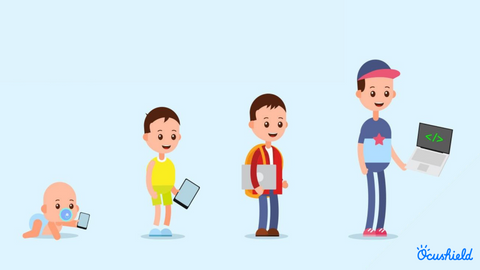Whether it’s studying, playing or spending quality time with the family - let’s be honest, there’s often a screen involved.
In recent years, we have become continuously more reliant on technology, meaning that we’re spending more of our time indoors, in front of screens or on our phones. Both at work and at home.
In particular, since lockdown began (thanks Covid-19) screen time has increased by up to 200% in the last 6 months alone. It’s now not unusual to see toddlers playing on tablets or teenagers falling asleep with their phones, but how much time are our kids spending in front of screens?

Our eyes absorb blue light all of the time, most notably from the sun. But what’s most concerning for our children’s health is blue light emitted from screens or digital devices - the worst cases being late at night, and for extended periods of time.
But blue light isn’t all bad! During the day, blue light from the sun can help to improve children’s attention, energy and mood.
However, artificial light from blue devices is particularly harmful at night time, as it can affect sleep cycles and circadian rhythms. This is because blue light blocks the production of a hormone called melatonin which regulates sleep cycles.

How do children and adults differ in the way they respond to blue light?
While blue light can have a significant impact on adult eyes, children are even more susceptible to the effects of blue light from digital devices. This is due to something called a crystalline lens, which is used to focus on objects.
When children are born, their crystalline lens is clear and over time, it yellows due to UV light exposure. This along with a thickening of the lense, as children grow, begins to act as a natural filter. As these young eyes have not yet developed a filter they don’t have that natural protection that adults do.
Children also possess a low amount of macular pigment which acts as a natural blue light filter in our eyes. This macular pigment begins to develop in children at the age of nine but can take up to the end of their teenager years to fully develop. This means children are not protected in the early stages of their development.
If that wasn’t bad enough, children also have larger pupils - which means more light enters the eye and reaches the retina.
"Children are most at risk from blue light exposure between the ages of 0-12, with less risk at 12-19 but still higher than those of ages 20+" - Dhruvin Patel, Founder, Ocushield.
We now know that blue light enters our children’s eyes easier, but why is this important?
As a parent, you’ll already be familiar with the impact of a sleepless night on your child’s mood and ability to focus – vital contributors to their daily development whether socialising in the playground or learning in the classroom. But how does blue light affect children?

As blue light affects sleep cycles, bedtime routines may become a bit of a problem for both tots and teens. Kids may find it difficult to fall asleep and stay asleep, as a result of late-night screen use.

As blue light affects sleeping patterns, it may also result in your child’s attention span throughout the day - particularly during a long school day.

Young, growing eyes focused on a lot of blue light may struggle to keep up. Now with technology playing a key role in the classroom, kids may not get a regular break from screens, which may result in blurry vision/strained ciliary & extra-ocular muscles.

Horrible Headaches
As well as affecting their vision, lots of time in front of screens and blue light may leave your little ones with headaches or feeling tired.
Don’t worry, it’s not all doom and gloom
There are a number of ways you can protect your child’s eyes from blue light - such as reducing screen time, encouraging them to use an old fashioned pen and paper, and protecting those peepers with an Ocushield screen protector. To find out more, just click below.
We have recently launched our Blue Light Glasses for Kids, which are developed exclusively by optometrists to protect up to 99% of Blue and UV light from younger, more vulnerable eyes. Head to our site to check out this range of blue light blocking glasses, which will significantly help in protecting your kids eyes from harmful cell damage.
How we reviewed this article:
Ocushield has strict sourcing guidelines and relies on peer-reviewed studies, academic research institutions, and medical associations.
Our experts continually monitor the health and wellness space, and we update our articles when new information becomes available.


Leave a comment